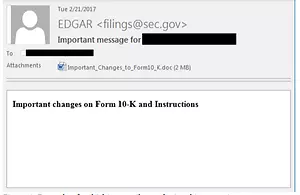
Since 2005, Missouri attorneys have struggled with the interpretation and application of Missouri’s collateral source rule as it related to evidence of a plaintiff’s medical treatment bills. Generally speaking, the collateral source rule bars a defendant from introducing evidence that part of a plaintiff’s damages were paid for by a party other than the defendant; i.e., the plaintiff’s insurance company or some other form of public benefit. In Missouri, however, that rule had been applied to allow plaintiffs to present evidence of the total amount billed by a health care ...

Southern Illinois was recently in the national spotlight as the path of a total solar eclipse passed across the state. This rare occurrence brought hundreds of thousands of people to a thin path of the state to experience a natural phenomenon that, if not experienced correctly, could cause serious and permanent eye injuries. It also created opportunities for some to profit from this influx of celestially motivated travelers. This event provided a reminder of the potential uses of exculpatory language in contract; namely to limit or eliminate liability by an express assumption of ...

As of August 28, 2017, the Daubert standard will now govern the admissibility of expert witness testimony in certain cases in Missouri.[1] This is the result of House Bill 153, one of the first bills signed by Governor Eric Greitens, which effectively changes the language in Missouri Revised Statute Section 490.065 moving the standard for admissibility of expert testimony from a broad to more stringent standard requiring the Court to assess the basis of a proposed expert’s testimony before allowing the expert to testify at trial.
The new language in the statute makes it clear that in ...
As most business law practitioners are aware at this point, the Illinois Limited Liability Act has been amended by HB 4361 and the amendments were effective July 1, 2017. The amendments to the Limited Liability Company Act include numerous provisions regarding member managed companies. This article will address some of the concerns regarding the amendments as they relate to member managed Limited Liability Companies ("LLC").
The Amended Limited Liability Company Act ("ALLC") institutes major changes to the "statutory apparent authority" previously granted to member managed ...
While movies and television shows never include a scene about jury instructions, in which the attorneys make impassioned (but boring) arguments about comma placement and the definitions of commonly used words, trial attorneys recognize that jury instructions can make or break a case. In a recent employment discrimination trial in Springfield, Illinois, faulty jury instructions may have cost the plaintiff a verdict in her favor, damages in the amount of $100,000, and attorney’s fees for a case that has been litigated since 2011.
The case of Schnitker v. Springfield Urban League ...
Over the past few years, insurance companies have learned that handling liability claims in Missouri with coverage issues or policy-limit settlement demands can be an incredibly complex, and in some cases, dangerous endeavor. Much of that complexity stems from Missouri Revised Statute § 537.065, a statute which has been used as a powerful sword against carriers to collect rather large judgments in many cases.
On April 26, 2017, the Missouri General Assembly voted to repeal the current § 537.065 and replace it with a modified version. That replacement, House Bill 339, was signed into ...

The Local Governmental and Governmental Employees Tort Immunity Act, 745 ILCS 10/1-101, et seq.—commonly known as the Tort Immunity Act—provides certain statutory immunities to local public entities. These protected entities include, but are not limited to, counties, townships, municipalities, school districts, park districts, and other local governmental bodies. See 745 ILCS 10/1-206. The Act sets forth those circumstances in which an entity is entitled to immunity, but many of the Act’s provisions expressly except immunity when an entity’s conduct is ...

Fast food restaurant chain Arby’s Restaurant Group Inc. is known for its great hot roast beef sandwiches and catchy slogan: “We have the Meats!” Arby’s is now communicating a different message; it may be the latest victim of a significant cyber breach.
How are we to digest this? We have grown somewhat immune to the now frequent website notices or press releases that announce that although no one is known to have been harmed, yet another potential information security incident has taken place at yet another company that may have once again exposed customer information.
So what ...

It appears to be innocent and routine. The CFO of your company forwards to you an urgent-sounding, personally addressed email from the Securities Exchange Commission’s EDGAR public filing system announcing changes to the reporting system. Last week you signed the attestation of the accuracy of your Quarterly Report on SEC Form 10-Q. You hope you have not made a mistake or missed an important change. You look over the email again. At first glance it appears legit:
Or it might be your worst nightmare: an email from the SEC questioning your firm’s disclosures, revenue recognition ...
Does your company monitor its network or devices for network security or data confidentiality? Does your company have any policies or practices that seek access to any employees’ personal online accounts? If so, a recent amendment to Illinois’ Right to Privacy in the Workplace Act (“Act”) may require your company to adopt or revise its policies or practices to comply with the law.
Expands the scope of protected content. The amendment has shifted the focus from social networking accounts or profiles to personal online accounts (POAs). A POA is “an online account, that is ...


